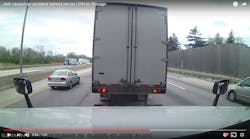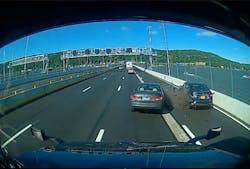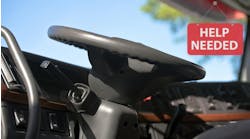Brake checking takes road rage to a new and more scary level, especially for truck drivers.
A typical scenario is when a motorist pulls in a front of a truck without giving the trucker time to put two seconds between them. Feeling like they’re being tailgated, the car driver brake checks – stops their car in the middle of the highway – causing the trucker to slam on their brakes. The driver may hit the stopped car causing damage, or they may miss the car altogether but cause a multiple pile up behind the truck.
Although less common, trucks sometimes brake check each other with disastrous results as seen in the video below.
According to the poster, the following incident occurred on May 9, 2018, on I-294 in Chicago. The brake check caused a complete stop on the interstate. Although the brake-checked truck was able to stop, the stoppage caused a 15-car pile-up with injuries. Caution: Strong language at the end.
Is brake checking becoming more common?
“Anecdotally, we might be seeing see more of it… It seems like there is more. That’s for sure,” said Doug Dahl, manager of Target Zero, a Washington state program to reduce traffic fatalities and serious injuries on Washington's roadways to zero by the year 2030.
He notes that the Washington Department of Licensing includes brake checking as one of the behaviors symptomatic of aggressive driving and road rage. The list also includes tailgating, the action that typically precedes a brake check. He adds, however, that there’s no hard data on brake checking incidents. “There’s not really a category of crashes caused by brake checking that an officer would check off on a collision report.”
The psychology of brake checking is more complex than a one-on-one incident of road rage in which one driver confronts another – makes eye contact at least – and could lead to screaming, finger gesturing or even a fight. “It seems to me that [brake checking] is really sort of ego-driven rather than rational, Dahl said.
“People say: ‘You’re in my space, I’m going to demand it back, and so I’m going to brake check you. If you hit me it’s your fault.’ We have this false perception that the following car is always at fault. That’s usually the case, but if someone slams on their brakes unexpectedly on a freeway, that’s not a behavior you would normally anticipate. They’d certainly be responsible, too. I think we’ve got such an entitled attitude towards driving that I’m going to have my space and if somebody follows too close or does something else I don’t like, I can use some action to show how much I dislike what they’re doing.”
For 25 years, Steve Albrecht has been teaching and consulting about workplace violence and is currently writing a book about road rage. He agrees that brake checking is a behavior in which the perpetrator can disavow any harm his actions may cause which makes it even more heinous. Unlike a typical road rage incident where someone may be injured in a fight, later sued or deliberately ram their vehicle into another and wait for police to show up. Brake checkers often leave the scene without any consequences.
“It’s an encounter that lasts for a few seconds and leave after which they leave so there’s no attachment to their behavior for what may have happened. If they cause a wreck either they don’t know about it or they drive off and say, ‘it’s not my fault.’”
“I think there’s a sense that we’re seeing much more of it [brake checking]," Albrecht added. "Often, people can now videotape it with their phone, so we’re seeing more evidence.”
Jason Palmer COO of SmartDrive explained that cameras on trucks are helping to exonerate truck drivers when they’re brake checked. “In a case study, one of our fleets was able to have the police officer completely write a different story of what happened in that particular collision. They were able to take that police report along with the video - and even though it became a DOT-reportable collision - appeal it and not have it count against their CSA. Having that video evidence in a timely fashion made all the difference in the world.”
He suggests that sometimes a dashcam that only triggers during an actual incident may not tell the whole story
“Typical brake check incidents aren’t something that happens in just ten, fifteen or twenty seconds. The entire incident, [including a lead-in], may happen over a course of a couple of minutes, and that doesn’t always trigger a camera. There may be people who gesture, yell or are swerving around our truck for several minutes, so capturing all that footage and providing it to the officer has been highly valuable.”
Because of this, Palmer says they’ve seen an uptick in continuous recording cams. “We’re also seeing a huge uptick in adoption of our multicamera solution. Fleets are doing it to protect their drivers, so they have more visibility around their vehicle, but it also helps in understanding what happens in these incidents. Sometimes the driver is reacting to a vehicle that swerves into their lane on the right side or they’re drifting over into their lane on the left side. Being able to have complete visibility around the tractor makes a big difference in understanding what happened.”
Albrecht and others suggest that brake checking also may be a symptom of current American culture. He says: “There’s a sense of just selfishness. ‘I’m entitled.’ You see it everywhere; there’s a rudeness in the culture, and it’s not just on the highway.”





